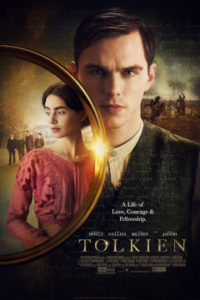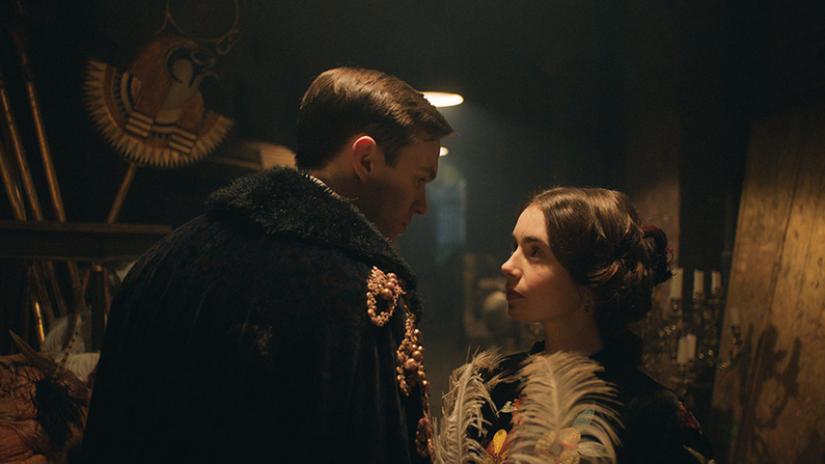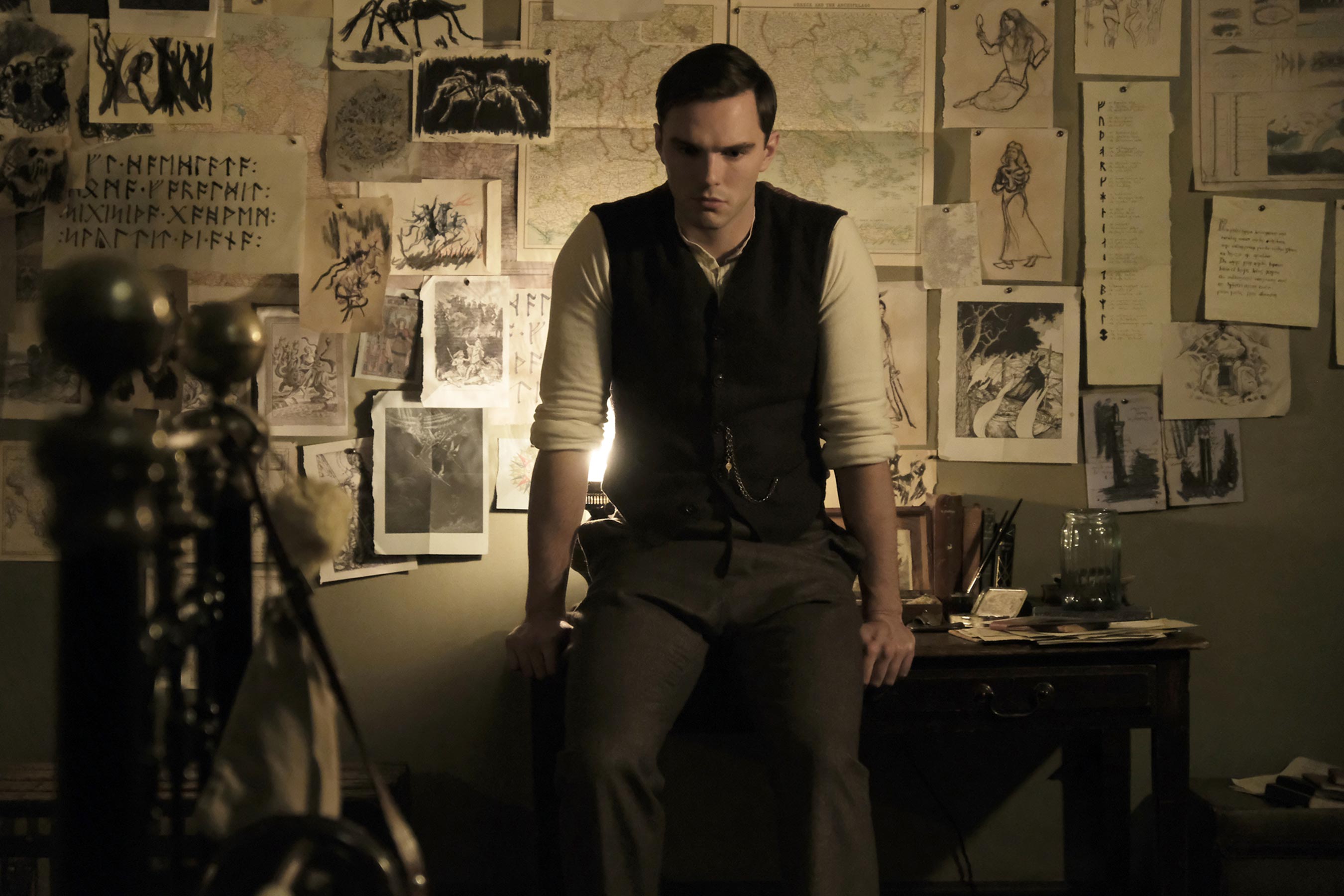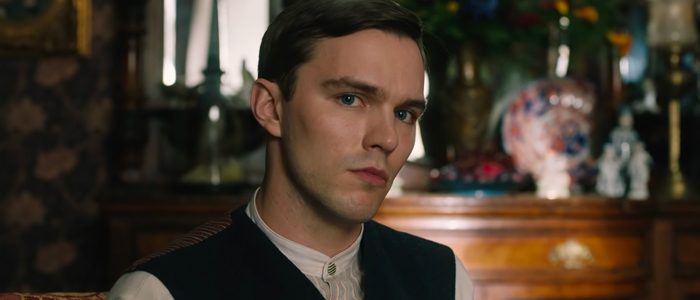TOLKIEN
 Starring: Nicholas Hoult, Lily Collins, Colm Meaney, Derek Jacobi, Anthony Boyle, Patrick Gibson, Tom Glynn-Carney, Craig Roberts
Starring: Nicholas Hoult, Lily Collins, Colm Meaney, Derek Jacobi, Anthony Boyle, Patrick Gibson, Tom Glynn-Carney, Craig Roberts
Directed by: Dome Karukoski
Written by: David Gleeson and Stephen Beresford
Studio: Fox Searchlight Pictures / Disney
It would be a mistake, I think, to go into the new Tolkien biopic–any Hollywood biopic, really–expecting perfect accuracy. People’s lives don’t have convenient story arcs. Major moments are interspersed with day-to-day life that doesn’t necessarily make for good cinema. Biopics can offer a particular vision of a celebrity’s life.
In the case of an artist, make some kind of argument as to where their inspiration came from. They’re rousing stories that make nice popcorn movies because they’re predictable–we go in knowing how they’re going to end. From this perspective, Tolkien generally succeeds. It’s got a lot of crowd-pleasing moments where words like “fellowship” are thrown around. Fans will recognize some episodes from Tolkien’s young life that have been lifted or adapted for the film, but anyone hoping to learn in-depth about the man or his literary output may find it shallow.
Tolkien, directed by Dome Karukoski and written by David Gleeson and Stephen Beresford, focuses on the writer’s (Nicholas Hoult) young life, his childhood friends, his love of language, and his relationship with his eventual wife (Lily Collins). These scenes are presented through flashbacks while a feverish Tolkien wanders through The Somme in WWI, where he connects the devastating imagery of war with the legends he grew up loving, and which would eventually inform his imagery of Middle-earth.
Far from the tweed-clad, pipe-smoking academic seen on book jackets, young Tolkien struggles with class divides as an orphan without financial backing. He’s also seen getting into mischief with his young friends, boys he meets in school who share his creative passions, each with their own specialties. He also meets another young orphan, Edith Bratt. The two fall in love, even as external barriers try to keep them apart. These early relationships guide Tolkien toward the man he would become and support his love of languages and mythology that would lead to his famous fiction.
The film’s earnestness sometimes verges on the saccharine, but it evokes some of the strongest aspects of Tolkien’s writing. Like many of the stories of Middle-earth, Tolkien is brimming with male friendships and platonic affection. The men in the film are unafraid to express their feelings and their desires, even hug and hold each other.
The love story between orphaned Tolkien and another orphan, Edith Bratt (later Edith Tolkien) is meant to provide much of the narrative anchor (Lily Collins is on the posters!). Tolkien’s friends are an essential part of that part of the story, too. His friends express jealousy that Tolkien has a girlfriend. They comfort him when he and his love are separated when he leaves for school, and again when it seems like the two may be separated forever. This isn’t to say that Edith doesn’t leave an impression on the narrative. One of the most effective scenes in the movie is when the two go for a coffee date and flirt while making up a story.

Unfortunately, extended scenes like this are sandwiched between parades of short scenes where we learn about the characters because they announce directly how they feel. We learn that young Tolkien loves language when he corrects a teacher on the pronunciation of his name. To make it clear, he later announces that “I love language.” Edith tearfully describes her unsatisfying day-to-day life to the audience. The film hasn’t had the time to pause and show us what her life looks like. It does a good job of making the characters endearing in this succession of short scenes.
For a film that already focuses on such a narrow part of Tolkien’s life–his adolescence and early adulthood, all before any of his most famous works were published–I wonder if narrowing it further might have made a tighter movie that didn’t have to move from scene to scene so breathlessly. We barely get to see him decide to become a writer, or why he thinks writing and publishing his mythology is so important, before the movie is over.
In that way, it felt like the filmmakers struck an odd balance with how much of Tolkien’s works they expect to be familiar for the average audience member. In the ending credits, a post-script describes that Tolkien had names of characters written on his and his wife’s graves; “a man who fell in love with an Elven princess.” Given that Beren and Lúthien are some of his most famous characters, it seems strange to not even give their names with the descriptors.
However, it also skips from his discharge from the War through when he began writing The Hobbit, only gently touching on what Middle-earth means to him, why he thought it was important to write, as well as offhandedly referencing the huge troubles he had getting parts of those works published. Despite being a film about a writer, Tolkien seems almost uninterested in his career as a writer; it wants to focus on him as a (young) man.

Despite a sometimes-odd focus, the performances make things as engaging as any early 20th-century British drama, if those are your thing. Nicholas Hoult is always a charming leading man. He lends a lot of humanity to Tolkien as he’s making up nonsense language, goofing off with his friends, or pursuing the head of the philology department in the hope of studying under him.
Lily Collins is pleasant. We don’t get to see as much of her life as I’d have liked. She explains to Tolkien (and the audience) what her life is like and what she’s passionate about. She gets limited screen time since so much of the story takes place at school (and those male friendships are a lot easier to relate directly to The Lord of the Rings). However, when she gets to assert a personality (such as when she argues with dorky Tolkien about what makes language important, the words or their meanings), she’s very endearing, and so are all of Tolkien’s school friends. I was especially impressed with all of the young actors at the beginning. They were fantastic and had wonderful chemistry as a group.
This is not a documentary or a comprehensive look, but it’s enjoyable enough as a Hollywoodification of Tolkien’s life. Fans of The Lord of the Rings movies may enjoy the score of Tolkien echoes Howard Shore’s score from those films, particularly in the choral singing.
The scenes that are allowed to breathe and allow the characters to enjoy each other’s company without breathlessly racing through exposition are when the movie really shines. It’s never a subtle movie, but it excels in grand gestures, like hitting you over the head with a very Tolkien-y scene change from the lush, green British countryside to industrialized, smoky Birmingham. The characters all have intense, huge emotions, which fit in the rapidly-changing times they were living in.
As a person who’s interested in his writing and his work, I would have liked to see the stories of Middle-earth dealt with more directly (he was writing early versions of stories about it when he came back from The Somme). Hopefully, this movie will give life to a more human (and less stuffy) image of J.R.R. Tolkien than exists in many people’s minds.


![[REVIEW] HALLOW’S EVE #1](https://geekd-out.com/wp-content/uploads/2023/02/52B3CE06-BF6A-4EDC-9FD6-275248E3F201-150x150.jpeg)

![[REVIEW] FALL OF THE HOUSE OF X: WEEK ELEVEN](https://geekd-out.com/wp-content/uploads/2024/03/fothox-3-feat-150x150.jpg)